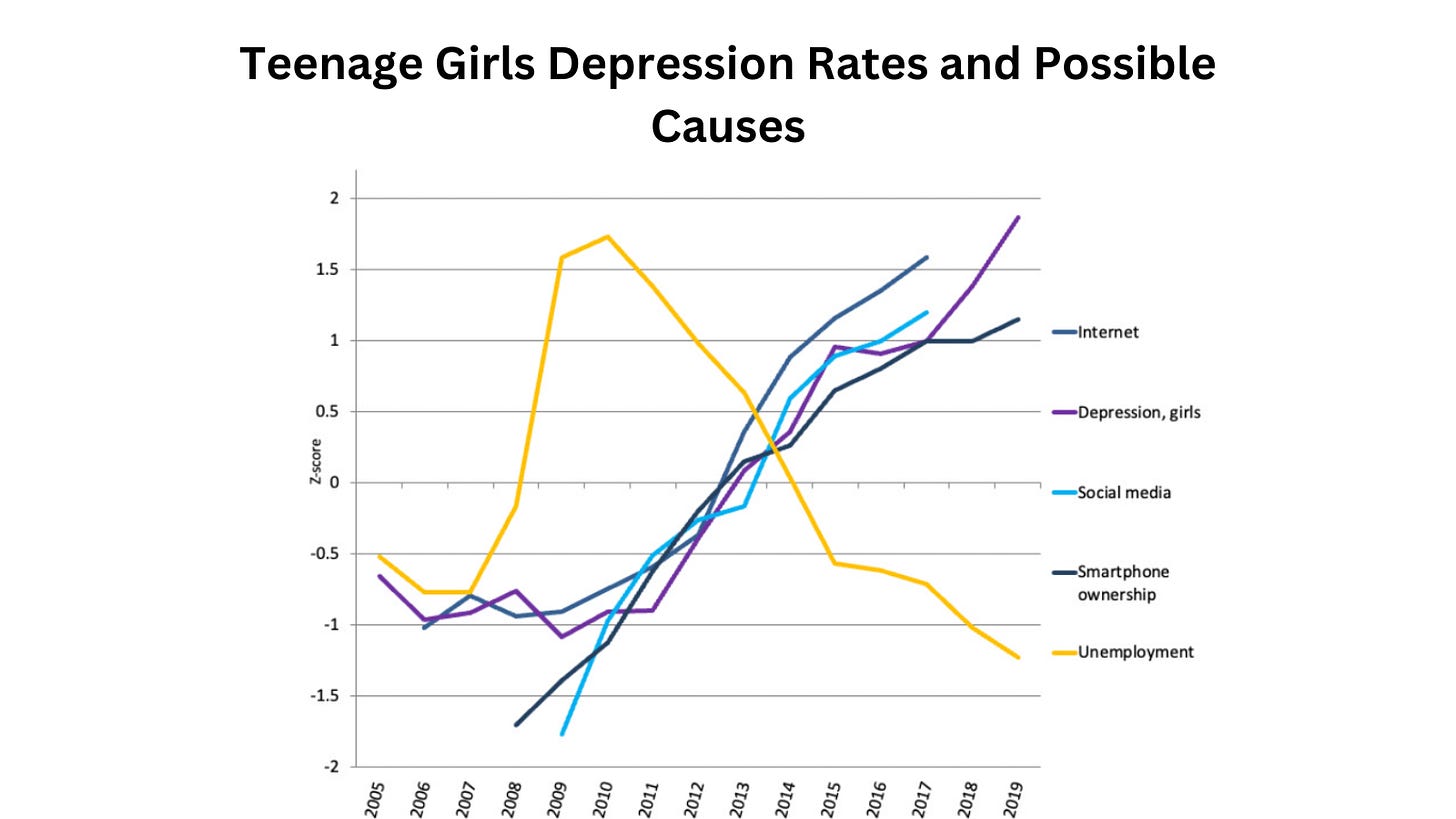iGen, Gen Z, The Anxious Ones
The Mental Health Crisis in our Teens and Young Adults
“Train children in the way they should go;
when they grow old, they won’t depart from it.” Proverbs 22:6 CEB
As a new parent in 1982, I knew life and culture were changing. I was only 23, so I embraced these changes with no thought whatsoever of the outcomes these changes would bring. I read the latest parenting books and magazines and did my best to do better than my parents, who were part of the Greatest Generation. I was the youngest by 20 years and my parents were already a generation older than my friends’ parents. Therefore, my parenting was influenced by people three major generations before me.
By the time my last two children were born (1998 & 2000), we were an internet-based society, and as early Gen Zs, they were introduced to the internet, social media, and smartphones. I don’t think I was quite prepared to deal with what was happening in our culture and with my younger children’s generation. My parenting differed from what their peers experienced, and they made sure I knew about that. Although my parenting was somewhat influenced by my parents, I chose to try to emulate the positives and NOT bring the negatives into my parenting.
My husband and I were ordained ministers and took our children to church each week. This was not enough to prevent my children from experiencing the same thing as their peers. No amount of prayer, and I prayed, could keep them from succumbing to the culture. Now, none of my children attends church regularly; a couple still believe in God, and a couple of them think we brought them up in a cult.
It seemed that our children were all experiencing some level of anxiety. My anxiety was a result of menopause, according to the doctor, as I never had it when I was younger. I could not understand what my husband and I did wrong or if there was something we failed to do.
However, I always sought out information as I am an avid reader and researcher. I discovered I was not the only parent wondering what had happened. As the mom of three Millennial children and two Gen Z children, I knew something was different with young people in our society: more stress, more anxiety, and a completely different outlook on life. I just could not figure out why.
Part of my Ph.D. research concerns Gen Z. I am reading various books and research papers and learning more about this younger part of the population. I discovered resources from Barna for churches about Gen Z, and other sources. When I presented a paper about my research at a symposium I learned that one of the panel members at the symposium, the author of Ordinary Discipleship, Jessie Cruickshank, does informal research among the young people she ministers to. She has a wealth of information collected. She directed me to Jean Twenge, who wrote iGen, Why Today’s Super-Connected Kids Are Growing Up Less Rebellious, More Tolerant, Less Happy - and Completely Unprepared for Adulthood.
A while ago I discovered Jonathan Haidt, a well-known psychologist and professor at New York University Stern School of Business. I was interested in what he was saying about his book at the time, The Coddling of the American Mind, and I saw him interviewed on a YouTube channel. Aside from his calm and articulate voice, the information he was researching caught my attention. I started following him on his Substack and After Babel, and looking at his research.
Haidt contends the advent of the smartphone and social media played a huge role in what happened to our kids (Haidt & Rausch, 2023). He discusses how children’s brains have been rewired. They’ve gone from play-based to phone-based interactions. It's all fascinating; I understand why they’ve linked these. He posits the rise in teenage depression and suicidal ideation all started to rise rapidly after the advent of the smartphone and social media.
This graph is provided in one of his Substack posts.
“Technology adoption, teen depression, and national unemployment, 2006-2019. Sources: National Survey of Drug Use and Health, Monitoring the Future, Pew Research Center, Bureau of Labor Statistics. See also Figure 6.39 in Generations.
Haidt found that these phenomena are not just about the USA. It also happened in Canada, the UK, Europe, and Australia. There is a correlation between how often in a day young people are on their phones. This is taken from the same article.
This graph tracks the suicide rate among young people in the UK:
“Percent of UK adolescents with “clinically relevant depressive symptoms” by hours per weekday of social media use. Haidt and Twenge created this graph from the data given in Table 2 of Kelly, Zilanawala, Booker, & Sacker (2019).”
The statistics show a concerning trend. Parents of Gen Z fear for their children’s well-being. I am worried about my Gen Z children (and grandchildren).
I am also worried about my older Millennial children. This generation, while grown and many with children of their own now, also faces the same trend in smartphone and social media addiction as they work and try to get ahead. Are anxiety levels increasing in their generation? Is it linked to the same thing? The Thriving Centre of Psychology conducted a survey which revealed that 28% of 1000 Millennials and Gen Zs experienced a decline in their mental health in 2023. The statistics showed that 55% said they have been to therapy. The top three reasons? Anxiety (76%), depression (72%), and stress (54%.) Dr. Alexander Alvarado, Licensed Clinical Psychologist and CEO of Thriving Centre, adds:
“Millennials and Gen Z are increasingly seeking therapy to cope with unique challenges like digital era anxieties, social pressures, and global uncertainties. Their openness to discussing mental health and valuing self-care represents a progressive shift towards acknowledging and managing the complexities of modern life” (Holt, 2023).
I interviewed my granddaughter, Sydney, who is 18, and graduating this June.
When I told Sydney what I was writing about, she was immediately interested. I asked her if she saw a lot of anxiety among her peers. She answered, “Yes. 100%.” She said that the majority of her friends had some level of anxiety. She has anxiety and sees a counsellor who is helping her overcome and move forward. I asked her what she thought was causing all this anxiety. “It’s a mix of things… cyberbullying, being bombarded with information, social media.” So much is happening around the world, she says, “We used to hear about things on the news on TV and they spread word of mouth.” Now, she says, they are all over social media and “spreading like wildfires!” Social media has led her to be afraid of taking the bus, eating certain foods, driving (because people are on their phones), and hearing about things in the ocean has caused her to be afraid to swim in it. She used to jump off the pier at summer camp, an annual tradition, but now she’s squeamish about it.
She also seems to be aware of the influence on TikTok from the Chinese government. She noted how TikTok in China is all positive videos but here it is all negative. She was getting on a plane to travel one time and TikTok showed her the door of a plane flying off. I was not surprised. Our phones are listening to us as we go through our days.
Various things are happening worldwide that also contribute to this phenomenon. Wars, protests, growing political division, tribalistic behaviour, and a victim mentality. All of this is causing a division among us. According to Amber Lee (2022), we must believe that we have shared beliefs and cultures to trust each other and bind our society’s social fabric. Pay attention. This happens everywhere, not just in the USA. In Canada, we are becoming increasingly polarized. No wonder our young adults are struggling. Here is a graph from Haidt’s work that shows an increase in suicide rates for Canadian youth:
“Canadian suicide rates across the lifespan by generation. Gen Z females have higher rates than previous generations. Gen Z males have similar rates compared to Millennials. Gen X had significantly higher rates than all generations during their teen years. Note that I only have access to data of 10-19-year-olds since 1982, so I cannot include the Baby Boomer or Gen X data when they were 20-24. (Source: Skinner & McFaull with data from Statistics Canada). (spreadsheet with graphs and data points).”
This international trend of declining mental health and increasing suicide, especially among Gen Z girls, is troubling. In Haidt’s new book, The Anxious Generation, he outlines four new norms that must be established:
No smartphones before high school
No social media before 16
Phone-free schools
More independence, free play, and responsibility in the real world
This current culture has affected the church. Gen Z is leaving the church in huge numbers. They are not buying the message of the church. Sarah Starkey (2023) writes,“Gen Z, however, believes that objective reality is…well, subjective. We’ve been taught that we are our own reality and how we feel about something determines whether or not it’s true.” It is all about feelings. She continues, “We are told that how we feel is our objective truth. This mindset sends us into the downward spiral of our emotions where we are powerless to defeat our feelings…because feelings have become the truest thing to us.”
The church must change the way they deal with this departing generation. Haidt contends that we’ve rewired our children’s brains with technology and social media. The church needs a strategy to address this issue. Barna.com is writing about Gen Z and the church, and resources can be found there to help churches address this current cultural context. It is not only our North American culture - it is happening around the world. Those in Christian mission organizations will need to be educated about this phenomenon.
As a Christian who teaches at a Christian university, this troubles me. If ever the world needed to believe in a God who loves them, it is now. Reaching this generation will be a challenge. Sarah Eekhoff Zylstra, in her article called 6 Things Christians Should Know About Gen Z, says that this digital generation are experiencing such rapid technological change. Even though Gen Z are falling away from the church, Zylstra says,
“…they aren’t inaccessible. They clearly see the brokenness of the world. They’re not afraid of hard questions about the meaning of life or the pursuit of justice. They’re looking for community. And all of those things are found in the gospel.”
If you are interested in this subject and are worried about our young people, I recommend you follow the research of those I mentioned in my article: Jonathan Haidt (and his Substack After Babel), Zach Rausch, Jean Twenge, and others. Also, follow Barna.com who also did research of Gen Z as it pertains to the church. They write and present their latest research and other research being done on this topic.
Undoing the damage won’t be easy or quick, but it’s possible.
References:
Eekhoff Zylstra, S. (2022, February 15). 6 things Christians should know about gen Z. The Gospel Coalition. https://www.thegospelcoalition.org/article/gen-z/
Haidt, J., & Rausch, Z. (2023, December 31). What we’ve learned about gen Z’s mental health crisis. What we’ve learned about Gen Z’s mental health crisis. https://www.afterbabel.com/p/best-of-2023?utm_source=profile&utm_medium=reader2
Holt, N. (2023, December 19). 2024 mental health outlook: Growing demand for therapy among Gen Z & Millennials. Thriving Center of Psychology. https://thrivingcenterofpsych.com/blog/gen-z-millennial-therapy-statistics/
Lee, A. H.-Y. (2022). Social Trust in polarized times: How perceptions of political polarization affect Americans’ trust in each other. Political Behavior, 44(3), 1533–1554. https://doi.org/10.1007/s11109-022-09787-1
Starkey, S. (2023, May 30). Generation Z & The Fight for Mental Health. Summit Ministries. https://www.summit.org/resources/articles/generation-z-the-fight-for-mental-health/







